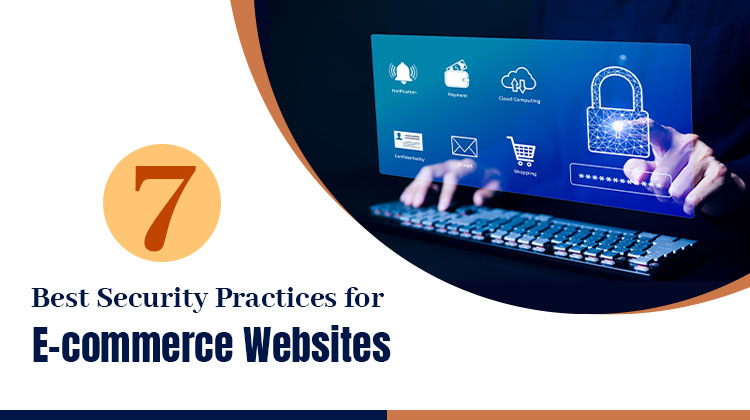
19 Aug, 2024
In the fast-evolving world of online business, ensuring e-commerce security is more critical than ever. As cyber threats become increasingly sophisticated, every eCommerce website development company must prioritize security measures when building and maintaining online stores. In 2024, it's crucial to adopt best practices that protect customer data, safeguard transactions, and maintain the integrity of your online business. Here are seven key security practices to implement into your eCommerce website.
If you're planning to build a secure online store, partnering with an experienced Ecommerce development company in India can give your business a competitive edge. These companies offer tailored Ecommerce development services that prioritize not only performance and scalability but also the highest standards of data protection and cybersecurity from day one.
1. Implement Strong SSL Encryption
One of the foundational elements of eCommerce Website Development is securing data transmission between the website and the user. This is achieved through SSL (Secure Sockets Layer) encryption. SSL certificates ensure that any data exchanged between your website and your customers is encrypted, preventing hackers from intercepting sensitive information such as credit card details, passwords, and personal data.
When a well known ecommerce website development company in Kolkata like Idiosys Tech ,incorporates SSL certificates into the site, it not only enhances security but also builds trust with customers. The padlock symbol in the browser’s address bar signals to users that their connection is secure, which can significantly boost their confidence in making purchases.
2. Use Multi-Factor Authentication (MFA)
Multi-Factor Authentication (MFA) adds an extra layer of security by requiring users to verify their identity through multiple methods before gaining access to their accounts. This could involve a combination of something they know (like a password), something they have (like a smartphone), and something they are (like a fingerprint).
For any ecommerce company like Idiosys Tech, integrating MFA is crucial in the modern landscape of e-commerce security. Even if a user’s password is compromised, MFA ensures that unauthorized access is significantly more challenging. As cyber threats continue to grow in 2024, MFA is becoming a standard practice for securing eCommerce websites.
3. Regular Software and Plugin Updates
Outdated software and plugins are a common entry point for cyberattacks. Hackers often exploit vulnerabilities in older versions of software, which is why keeping everything up-to-date is critical. During the process, it’s important to choose platforms and plugins that receive regular updates from their developers.
Idiosys Tech, a top eCommerce website development company in Kolkata, always sets up automated updates or reminders to ensure that the site’s software remains current. Regular updates help patch vulnerabilities, protect against new threats, and ensure the website continues to operate smoothly.
4. Secure Your Payment Gateway
Payment gateways are at the heart of any eCommerce operation, processing sensitive financial information. Ensuring that this process is secure is vital for both your business and your customers. Choosing a PCI DSS-compliant payment gateway is essential for eCommerce Website Development. The Payment Card Industry Data Security Standard (PCI DSS) is a set of security standards designed to protect cardholder data.
By selecting a compliant gateway, you ensure that the payment process is secure, minimizing the risk of data breaches. Additionally, consider using tokenization, which replaces sensitive card information with a token that can be safely transmitted over the internet.
5. Conduct Regular Security Audits
A proactive approach to e-commerce security involves regular security audits. These audits assess the current security measures, identify potential vulnerabilities, and recommend improvements. Idiosys Tech, an ecommerce website design company in Kolkata offers ongoing security audits as part of our service package. These audits can include penetration testing, vulnerability scans, and reviews of access controls. By conducting these audits regularly, you can identify and address security weaknesses before they become a problem.
6. Use Web Application Firewalls (WAF)
Firewalls are a critical component of e-commerce security, acting as a barrier between your website and potential threats. A Web Application Firewall (WAF) is specifically designed to protect web applications by filtering and monitoring HTTP traffic between a web application and the internet. When developing an eCommerce website, integrating a WAF is essential to protect against a wide range of threats, including SQL injection, cross-site scripting (XSS), and DDoS attacks. A WAF can also help mitigate the risk of data breaches by blocking malicious traffic before it reaches your server.
For any leading ecommerce website design company in Kolkata like Idiosys Tech, recommending and implementing WAFs is the best practice that should not be overlooked. In 2024, as cyberattacks become more sophisticated, WAFs provide an additional layer of defense that is crucial for maintaining the security of your eCommerce site.
7. Educate Your Team and Customers on Security Practices
Technology alone is not enough to ensure e-commerce security; human behavior plays a significant role as well. Educating both your team and your customers on best security practices can greatly reduce the risk of breaches. For your team, regular training sessions on identifying phishing scams, using strong passwords, and following secure data handling procedures are essential. An eCommerce Website Development Company should also provide resources and guidelines for educating customers on how to protect their accounts, recognize secure websites, and avoid suspicious links.
In 2024, the human element remains a critical factor in ecommerce website development. By fostering a culture of security awareness, you can enhance the overall security of your eCommerce site and build stronger trust with your customers.
Conclusion
As eCommerce continues to grow, so do the security challenges that businesses face. Implementing these seven best practices is important for any business looking to protect itself and its customers in 2024. From using SSL certificates to conducting regular security audits, these measures form the foundation of robust e-commerce security.
Remember, ecommerce website development is not just about creating a functional site; it’s about creating a secure, trustworthy environment where customers feel confident in making their purchases. By following these best practices, you can ensure your eCommerce site remains secure and successful in 2024 and beyond.
--------------------------------------------------------------------------------------
Why is security important for eCommerce websites?
Security is crucial for eCommerce websites to protect customer data, maintain trust, prevent financial loss, and avoid legal issues due to data breaches.
What is two-factor authentication (2FA), and how does it enhance security?
2FA adds an extra layer of security by requiring users to provide two forms of verification, such as a password and a code sent to their phone, making it harder for attackers to gain access.
What is PCI DSS, and why is it important for eCommerce websites?
PCI DSS (Payment Card Industry Data Security Standard) is a set of security standards for companies that process credit card payments. Compliance helps protect customer payment information and reduce fraud.
How can I implement data encryption on my eCommerce website?
Ensure your site uses HTTPS and consider encrypting stored data, such as customer information and transaction details, using secure algorithms.
What are regular security audits, and why are they important for eCommerce sites?
Security audits are comprehensive reviews of your website’s security measures to identify and address vulnerabilities, helping to protect against attacks.
How can I manage software and plugin updates effectively?
Enable automatic updates for critical software and plugins, regularly check for updates, and test them on a staging site before deploying to your live site.
--------------------------------------------------------------------------------------
You May Also Read
How to Develop a Custom E-Commerce Marketplace in 2024
How to make responsive e-commerce front end by Bootstrap
woocommerce or Magento: What to choose for e-commerce in 2020?

